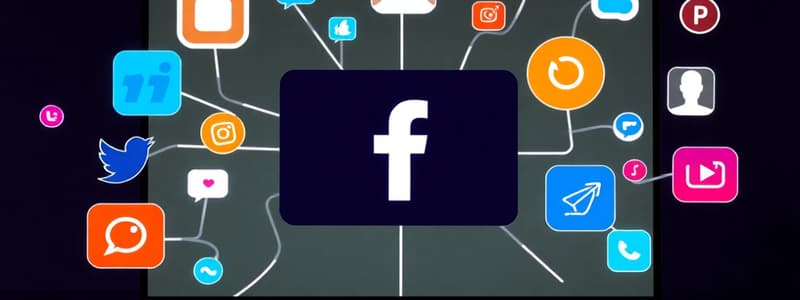Podcast
Questions and Answers
The Philippine government enacted Republic Act 10175, also known as the ______, to ensure the responsible use of digital platforms.
The Philippine government enacted Republic Act 10175, also known as the ______, to ensure the responsible use of digital platforms.
Cybercrime Prevention Act of 2012
Using social media to harass, intimidate, or harm others is known as ______.
Using social media to harass, intimidate, or harm others is known as ______.
cyberbullying
According to the THINK acronym for responsible social media use, before posting, one should ask: Is it ______?
According to the THINK acronym for responsible social media use, before posting, one should ask: Is it ______?
true
Sharing personal details or private conversations online without consent raises ______.
Sharing personal details or private conversations online without consent raises ______.
[Blank] is accessing someone's computer or account without permission.
[Blank] is accessing someone's computer or account without permission.
Flashcards
Cyberbullying
Cyberbullying
Using social media to harass, intimidate, or harm others.
Misinformation
Misinformation
Spreading false or misleading information, causing confusion and harm.
Netiquette
Netiquette
It refers to the proper way of behaving on the internet, and helps maintain respect and harmony in digital spaces.
Hacking
Hacking
Signup and view all the flashcards
Identity Theft
Identity Theft
Signup and view all the flashcards
Study Notes
Responsible Use of Social Media
- Social media has transformed global communication and information sharing
- Its impact relies on responsible usage to foster relationships and promote a safe digital space
- Discipline in online interactions is important for being responsible digital citizens.
Understanding Social Media
- Social Media is a mass communication tool for sharing information, ideas, and personal messages
- It is a tool that can be used for both positive and negative activities
Positive Effects of Social Media
- Social media helps people stay connected with family, friends, and communities regardless of distance
- Social media gives access to valuable information, online courses, and learning resources
- Social media promotes awareness for social movements and charitable causes by giving them exposure
Negative Effects of Social Media
- Cyberbullying is the use of social media to harass, intimidate, or harm others
- Oversharing private information can lead to security and privacy risks
- Misinformation spreads false or misleading information and causes confusion
- Excessive social media use can negatively affect mental health, leading to stress and anxiety
Understanding Your Digital Footprint
- Online activity leaves a permanent mark because even deleted posts can be saved
- Social media history can be reviewed by schools, employers, and organizations when they make decisions
- You should always remain mindful of what you share online
Key to Responsible Social Media
- When sharing online, remember to THINK:
- T - Is it True?
- H - Is it Helpful?
- I - Is it Inspiring?
- N - Is it Necessary?
- K - Is it Kind?
Practicing Netiquette
- Netiquette means practicing proper behavior on the internet
- Good netiquette maintains respect and harmony in digital spaces
- Think before you post to avoid posting anything that might offend or harm others
- Respect privacy and avoid sharing private details or conversations without consent
- Avoid cyberbullying and hate speech; instead, be kind and avoid spreading negativity
- Always verify information before sharing, checking sources to prevent the spread of false information
- Be mindful of tone to avoid your messages being misinterpreted; and always communicate clearly and with respect.
Philippine Cybercrime Prevention Act of 2012 (RA 10175)
- Republic Act 10175, aka the Cybercrime Prevention Act of 2012, was enacted by the Philippine government
- RA 10175 ensures digital platforms are used responsibly
- The law protects people against online crimes and promotes safety in cyberspace
Key Points of RA 10175
- Common cybercrimes:
- Hacking is accessing someone's device without permission
- Identity theft involves pretending to be someone else online to steal information
- Online fraud is scamming people for money or personal details
- Cyberbullying and Online Libel mean spreading false or harmful information about someone
- Cybersex and Child Pornography is defined as sharing inappropriate photos or videos of children
- Penalties for Cybercrimes:
- Cybercrime violators can face fines or imprisonment
- Authorities such as the Philippine National Police (PNP) and the National Bureau of Investigation (NBI) track down cybercriminals.
- Even if the crime happens outside the Philippines it is still prosecutable if it affects Filipinos.
- Enforcement of RA 10175:
- The Department of Information and Communications Technology (DICT) enforces cybersecurity measures and ensures compliance with RA 10175.
- The Cybercrime Investigation and Coordinating Center (CICC) investigates and prevents cybercrimes alongside the PNP and NBI
- The Department of Justice (DOJ) holds offenders accountable and prosecutes them for cybercrimes.
- How RA 10175 Protects You:
- RA 10175 prevents online scams, hacking, and cyberbullying
- RA 10175 encourages responsible social media use
- RA 10175 provides a way to report cybercrimes to the authorities
Studying That Suits You
Use AI to generate personalized quizzes and flashcards to suit your learning preferences.




